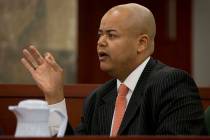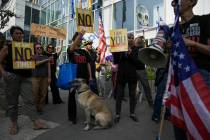Initiative petition process complicated by new law
CARSON CITY -- Whether you favor a Proposition 13-style property tax cap or you want to take some other cause directly to Nevada voters through the citizen initiative petition process, qualifying a measure for the ballot has been made more complicated with a new law passed by the Legislature.
The law requires people to gather a set number of signatures in each of Nevada's 17 counties based on the population of each county to qualify a measure for the ballot. In the last election cycle, all the signatures needed could be collected in just one urban county.
The ACLU of Nevada says the new requirement is unconstitutional, and the group plans to challenge the law in federal court in the coming weeks.
"We've already committed ourselves to challenging the new law," said Gary Peck, executive director of the organization. "It is essentially the old law dressed up in different language. It's even worse than the old law."
But Sen. Dean Rhoads, R-Tuscarora, believes the new requirement is defensible. It is not based on some arbitrary number, but the actual population of each county based on the 2000 census.
Urban counties would continue to have most of the clout in the initiative petition process, he said.
"The idea is to give rural counties the chance for input," Rhoads said. "The rural counties would need to make up only a small percentage of a petition. But it would require petitioners to get out to the rural counties."
The previous requirement for Nevada petitioners was to collect signatures representing 10 percent of those who voted in the previous general election in 13 of 17 counties.
The 9th U.S. Circuit Court of Appeals overturned that requirement, however, saying it violated the constitutional principal of "one man, one vote" by allowing a small number of voters in a sparsely populated county to preempt the wishes of the majority.
As a result of the appeals court ruling, petitioners in 2006 were able to collect all the signatures they needed, defined as 10 percent of the total who voted in the previous general election, in just one or two densely populated counties such as Clark and Washoe.
But the 2007 Legislature changed the rules again.
Rather than just collect 58,628 signatures, or 10 percent of those who voted in 2006, from any large county, a new formula has been devised. The formula, unless it is overturned, will apply to the initiative process that begins Sept. 1 for the 2008 general election,
The new formula requires signatures to be collected based on 10 percent of Nevadans who voted in the previous general election multiplied by the percentage of a county's share of the statewide population.
To determine the number of signatures required in Clark County, for example, the 10 percent who voted in the 2006 general election totaled 58,627. Multiplied by Clark County's share of the total state population, which is about 69 percent according to the 2000 census, the number of signatures needed in Clark County is 40,364.
Using the same formula for Lincoln County, the 10 percent of the vote in 2006 would be multiplied by .2 percent, the county's share of the state population, making the signature requirement would be 122.
"We've already had discussions with a number of potential plaintiffs," Peck said. "It is important that these folks know from the outset what the rules are. Initiative campaigns are very costly and very complicated."
Sharron Angle, chairwoman of We the People Nevada, a group that plans to seek a Proposition 13-style amendment to the state constitution in 2008, said she too believes the new rule is unconstitutional.
Rhoads said the purpose is to give voters across the state a say on issues. For rural Nevada, where ranching and mining are important to the economy, it would be unfair to have some measure regulating these industries qualified for the ballot by collecting signatures only in urban areas, he said.
"My fear is what happened in Montana, where they outlawed the use of cyanide in all mining operations," Rhoads said. "They got all the signatures for the initiative petition in urban areas."
The 1998 ban on the use of cyanide was for new mining operations and was approved by Montana voters.

















